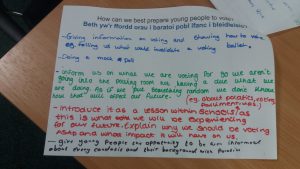
On Friday 12th April 2019 we were honoured to be involved at the launch event for Pembrokeshire Democracy Champions. This innovative youth engagement event, organised by Pembrokeshire County Council and supported by the Department of Local Government, bought together nearly 50 young people age 14-16 from across Pembrokeshire who were interested in becoming ‘Democracy Champions’ in their school to discuss a number of political issues including the imminent lowering of the voting age to 16 in Wales.
As well as asking the attendees their views on lowering the voting age in Wales, the event also involved debate on the crucial issue of young people’s political education and concluded with a workshop from electoral registration officers who ran a mock election exercise. The event had a deliberative structure with young people being asked an identical list of questions at both the beginning and end of the event to assess if their views had shifted at all after a day spent discussing the issue.
At the start of the event 80% were in favour of lowering the voting age to 16, which is consistent with the high level of support our October 2018 survey found. At the end of the workshop support had dropped slightly to 71%. However, despite the initial enthusiasm for lowering the voting age only 20% of attendees knew how to vote at the beginning of the day. Thanks to the successful workshop run by Pembrokeshire electoral services the number saying they knew how to vote had increased to 96% at completion of the day! Likewise confidence in knowing how to actually cast a vote increased from 36% to 89%. Despite this increase in voter understanding the attendees remained split on whether young people’s voices are heard in Welsh Politics with a consistent 50% division between those who felt they were heard and those who felt they were not.
We are very grateful to the organisers for the opportunity to run focus groups at this event and received some very interesting comments on votes at 16 in Wales from the young people who attended. One consistent theme was the desire for more information to be received in schools about what it is the political parties stand for. Several attendees argued that this was important for allowing young people see why politics might be relevant to them. However, there was also acknowledgement that politics is perceived as a negative thing and that this get reinforced by the way teachers and parents talk about it. Many of the more politically engaged young people in the focus groups discussed with us how important it is that young people receive positive images of politics in schools from an early age. The idea of more regular lessons in political education was popular but some attendees felt that politics couldn’t be treated as any other subject or it would be seen as boring and irrelevant. It was important politics was made to seem interesting.
During the debate on votes at 16 those young people who were opposed to the idea mentioned their lack of knowledge and confidence in their understanding of politics as a reason to keep the voting age at 18. Others mentioned the importance of life experience and maturity and one even demanded a vote on whether to raise the voting age to 21 – of which there was 1 supporter! However, these arguments were countered by the majority in the room who supported lowering the voting age to 16. One contributor pointed out that they had a job as a lifeguard at 16 so it made no sense to trust someone with a life but not with a vote. Others pointed out how many political decisions are likely to have a long term impact 16 year olds in the context of climate change.
We used sheets to allow attendees to express their thoughts on a number of important issues related to Votes at 16 and they respondent with really interesting and thoughtful comments (see example). Overall, we were really impressed with the depth, knowledge and honesty with which the Pembrokeshire Democracy Champions engaged in this issue. It’s also impressive to see a council and electoral registration really engaging with young people in this way. We hope the Democracy Champions project is successful and we look forward to taking part in future events and for ensuring the views of the attendees are heard in our project.